Unlocking the Rich Benefits of Hemp Seed Oil for Daily Wellness
Written by: Hunter Podell, Subject Matter Expert and Website Founder
Published: March 15, 2024; Last updated: April 6, 2024
- 1. Key Takeaways
- 2. Hemp Seed Oil: Nutritional Powerhouse
- 2.1 Essential Fatty Acids
- 2.2 Amino Acids
- 2.3 Vitamins and Minerals
- 3. Extraction and Quality
- 3.1 Cold Pressing
- 3.2 Organic Sourcing
- 3.3 THC Concentration
- 4. Health Benefits of Consuming Hemp Seed Oil
- 4.1 Heart Health
- 4.2 Skin Health
- 4.3 Immune System Support
- 5. Incorporating Hemp Seed Oil into Your Diet
- 5.1 Salad Dressings
- 5.2 Smoothies
- 5.3 Cooking with Hemp Seed Oil
- 6. Topical Uses for Hemp Seed Oil
- 6.1 Skincare
- 6.2 Lip Balm
- 6.3 DIY Recipes
- 7. Potential Risks and Side Effects
- 7.1 Allergic Reactions
- 7.2 Drug Interactions
- 7.3 Quality Control
- 8. Summary
- 9. Frequently Asked Questions
- 9.1 What does hemp seed oil do for you?
- 9.2 Is hemp seed oil the same as CBD?
- 9.3 What does hemp seed oil do for hair?
- 9.4 Can hemp oil make you sleepy?
- 9.5 Can I use hemp seed oil for cooking?
- 10. References
Are you wondering about the hype around hemp seed oil? Extracted from Cannabis sativa seeds, this oil offers a nutritious blend of fatty acids, proteins, and other essential nutrients. Our comprehensive guide examines what hemp seed oil is, its potential health advantages, and practical uses, answering why this natural oil might be the missing piece in your quest for a balanced lifestyle.
Key Takeaways
Hemp seed oil is a nutritional powerhouse, offering a rich source of essential fatty acids, complete proteins (all nine essential amino acids), vitamins E, C, and B, and important minerals like magnesium and zinc.
Cold pressing is the preferred extraction method for high-quality hemp seed oil. Consumers should opt for cold-pressed, organically sourced products with a THC concentration of less than 0.3% to avoid psychoactive effects.
The consumption and topical application of hemp seed oil provide numerous health benefits, including improved heart and skin health and enhanced immune system function. Still, users should be mindful of possible allergic reactions and drug interactions and ensure quality control.
Hemp Seed Oil: Nutritional Powerhouse
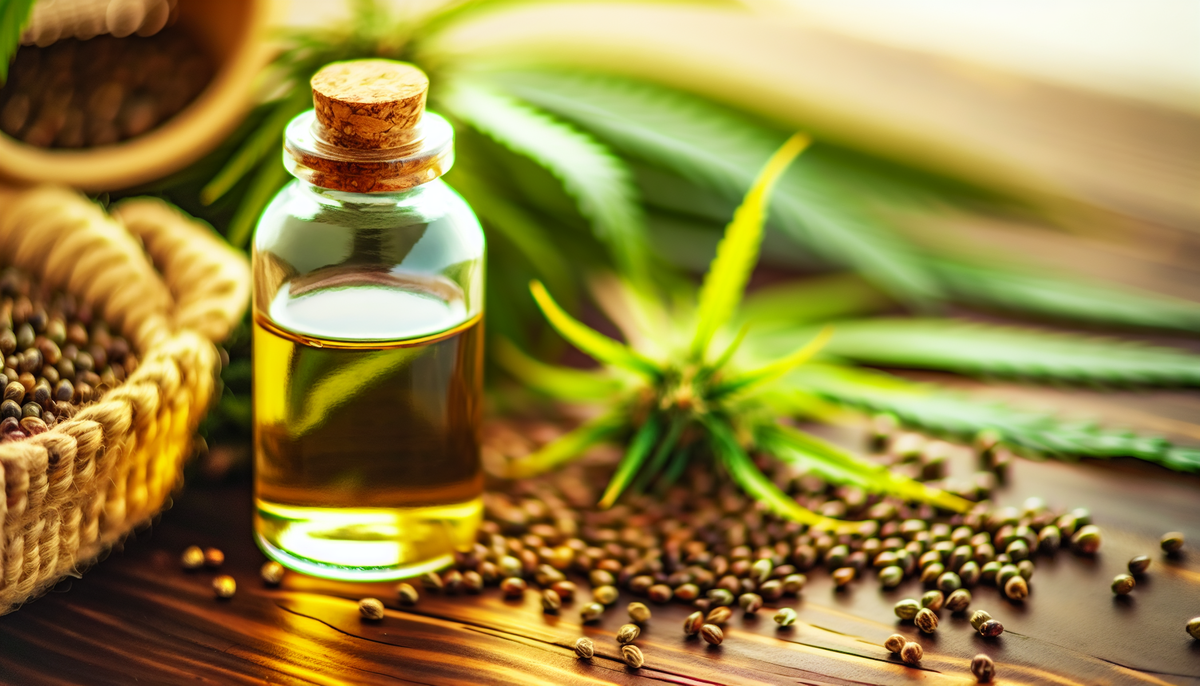
Obtained from the seeds of the Cannabis sativa plant, hemp seed oil, also known as hempseed oil, is a rich source of essential fatty acids, making it a nutritional powerhouse. Its high concentration of these fatty acids provides numerous health benefits when consumed. But what makes hemp seed oil so special? It’s all about the unique blend of nutrients it brings to the table.
Essential Fatty Acids
Seeds of the industrial hemp plant, a variety of the cannabis plant, are abundant in omega-3 fatty acids and omega-6 fatty acids, which are crucial for maintaining overall health. Incorporating dietary hempseed into your diet can aid heart health, reduce inflammation, and enhance brain function.
The rich fatty acid content in hemp seed oil also potentially helps to treat skin diseases.
Amino Acids
Hemp seeds are a complete protein source, providing all nine essential amino acids for human nutrition. These include:
Histidine
Isoleucine
Leucine
Lysine
Methionine
Phenylalanine
Threonine
Tryptophan
Valine
Thus, including hemp seed oil in your diet enhances your heart and skin health and bolsters your protein intake, as hemp seed oil strengthens your overall well-being. ¹
Vitamins and Minerals
The nutritional benefits of hemp seed oil extend beyond this! It is abundantly enriched with vitamins E, C, and B and minerals such as magnesium and zinc. ¹
With just three tablespoons, you can get over half of your daily magnesium needs, supporting metabolic health and overall well-being. Not to mention, hemp seed oil also contains a significant amount of zinc, essential for immune function and DNA synthesis.
Extraction and Quality
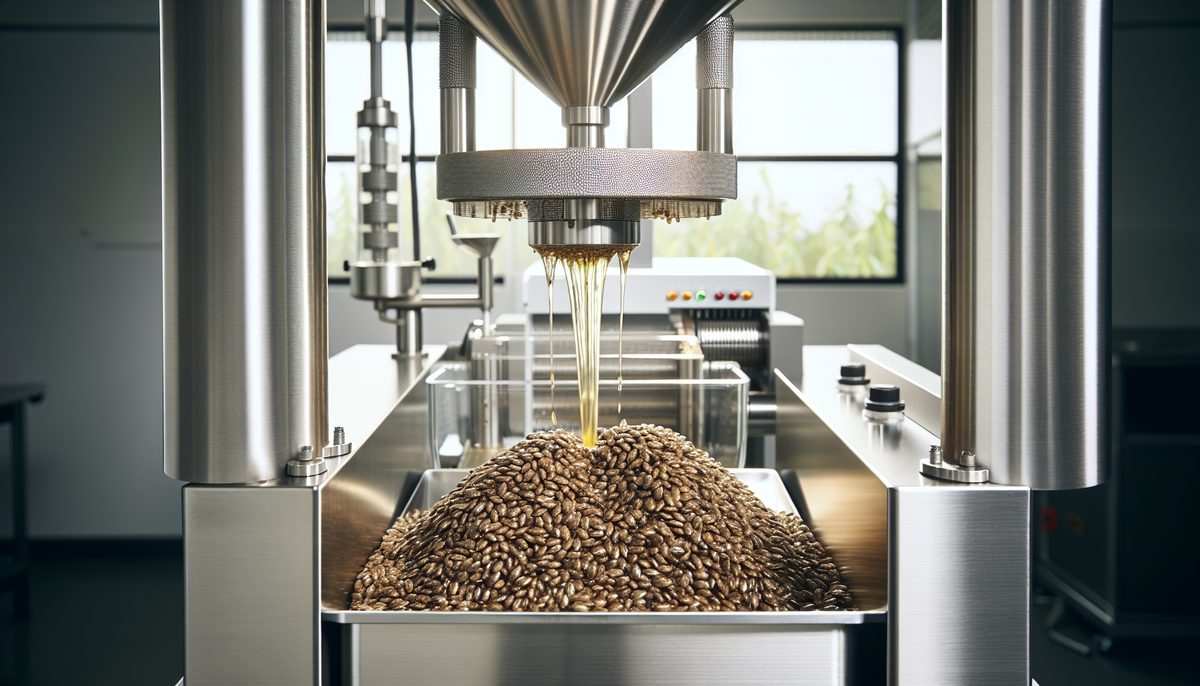
Now that we’ve seen the nutritional power of hemp seed oil let’s look at how it’s extracted. The quality of hemp seed oil depends on the extraction method, organic sourcing, and THC concentration.
The preferred extraction method for obtaining high-quality hemp seed oil is cold pressing, which helps preserve all those beneficial nutrients.
Cold Pressing
Cold pressing involves using a mechanical screw press to extract oil without the use of heat or chemicals. This method is beneficial as it helps preserve the nutrients present in the oil, including cannabinoids, terpenes, flavonoids, vitamins, and minerals.
Hence, ensure that the hemp seed oil product you choose is cold-pressed.
Organic Sourcing
Organically sourcing hemp contributes to the quality of hemp seed oil in the following ways:
The hemp used for oil production is grown without harmful chemicals
The plants can absorb rich nutrients from the soil
This results in a higher-quality product
Hence, it is advisable to opt for organic hemp seed oil when purchasing it.
THC Concentration
Another factor to consider is the THC concentration in hemp seed oil. THC is the psychoactive compound in Cannabis sativa, but it’s present in very low levels in hemp seed oil – usually less than 0.3%. This low concentration won’t give you a “high,” but it’s still important to be aware of it, especially if you’re sensitive to THC or have to take drug tests for work.
Health Benefits of Consuming Hemp Seed Oil
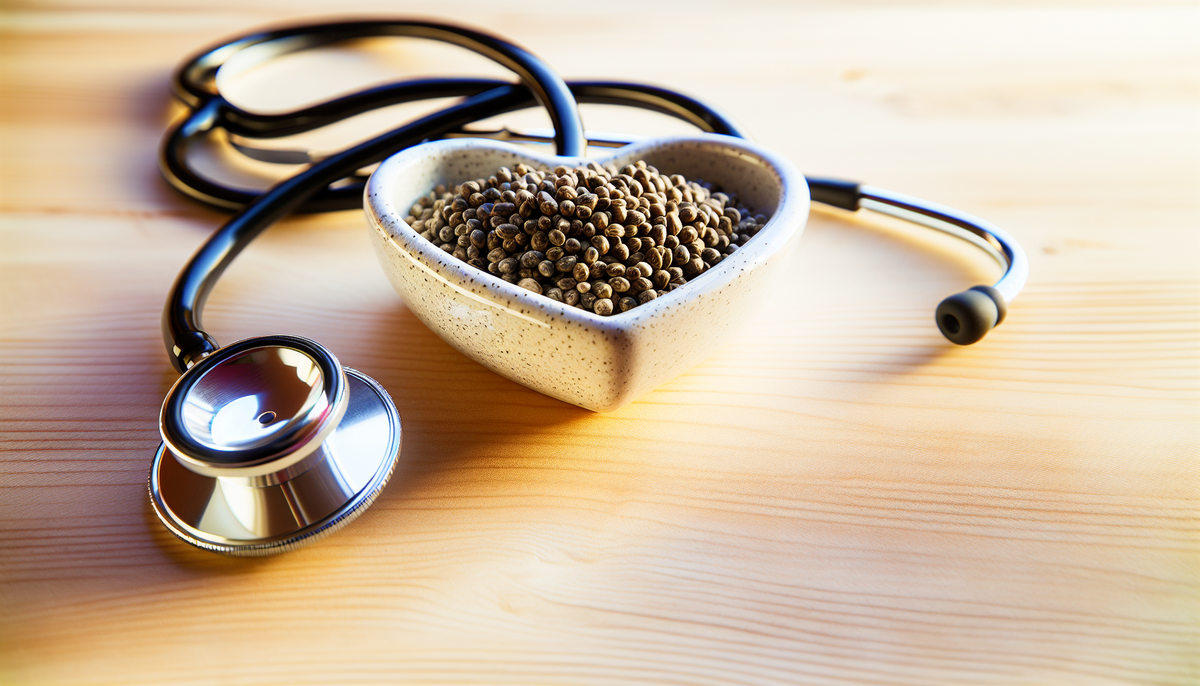
Considering its nutritional profile and quality considerations, we can now explore the health benefits of consuming hemp seed oil. This versatile oil can improve heart health, enhance skin health, and even support your immune system.
Heart Health
The omega-3 and omega-6 fatty acids in hemp seed oil are known for their heart health benefits. These essential fatty acids help reduce inflammation, lowering the risk of heart disease. Plus, studies have found that these fatty acids can help reduce blood pressure and support a healthy cardiovascular system. ²
Skin Health
Hemp seed oil can also do wonders for your skin. Its fatty acids and vitamins can reduce acne and inflammation, leading to healthier skin. Plus, it’s been found to improve conditions like eczema and psoriasis, offering relief for individuals dealing with these skin issues. ¹
Immune System Support
Lastly, the nutrients in hemp seed oil can support a healthy immune system. It’s rich in vitamin E and healthy polyunsaturated fatty acids, which help strengthen the immune system. Plus, it contains various other nutrients that can support overall wellness.
Incorporating Hemp Seed Oil into Your Diet
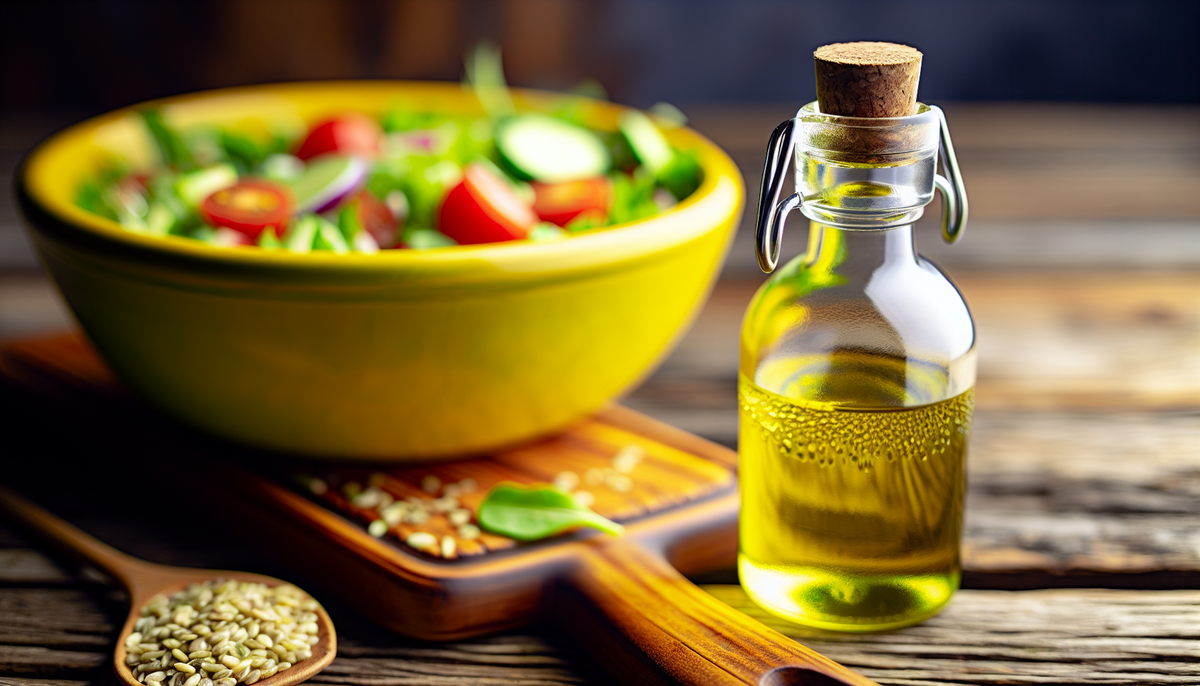
You may ponder about how to incorporate hemp seed oil into your diet. Here’s the easy part! It can be used in salad dressings, added to smoothies, or used in cooking while being mindful to avoid high temperatures to maintain its nutritional content.
Salad Dressings
Hemp seed oil makes a great base for salad dressings. Its nutty flavor pairs well with various ingredients and adds a nutritional boost to your salads.
Try blending it with tahini, garlic, lemon juice, and salt for a delicious and nutritious dressing.
Smoothies
Add hemp seed oil to your smoothies for an extra dose of healthy fats and protein. Just a tablespoon or two can enrich your smoothie’s nutritional profile and provide a host of health benefits, including:
Improved heart health
Reduced inflammation
Enhanced brain function
Balanced hormones
Stronger immune system
Plus, it adds a subtle, nutty flavor that complements many smoothie ingredients.
Cooking with Hemp Seed Oil
Cooking hemp seed oil can be a great way to incorporate it into your diet. Whether you’re drizzling it over cooked grains or incorporating it into sauces, it can enhance the flavor of your dishes while adding a dose of nutrition. Just remember to avoid high temperatures to preserve its nutritional content.
Topical Uses for Hemp Seed Oil
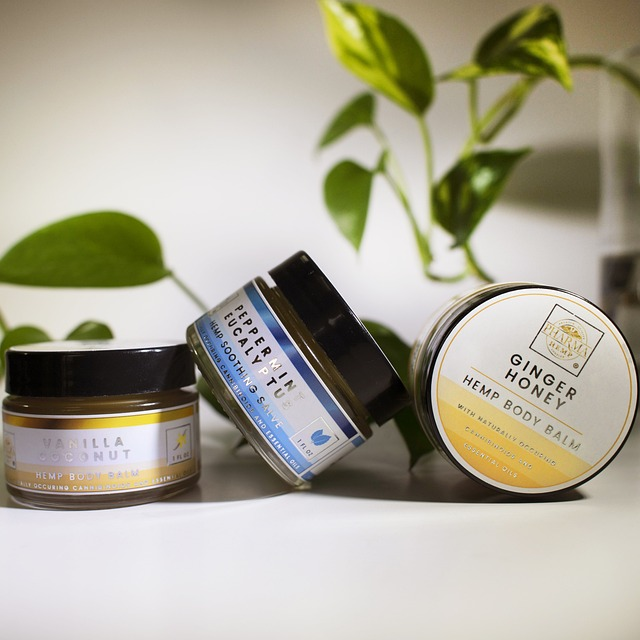
The uses of hemp seed oil extend beyond consumption. It can also be applied topically for skincare, used as a lip balm, or included in DIY skincare and beauty recipes.
Skincare
When applied to the skin, hemp seed oil can moisturize, reduce inflammation, and improve overall skin health. Its fatty acids and vitamins nourish the skin, and it’s been known to reduce acne and inflammation.
Thus, if enhancing your skincare routine is your goal, incorporating hemp seed oil could be beneficial.
Lip Balm
Hemp seed oil also makes a great natural lip balm. It can nourish and protect your lips, providing essential moisture and protecting against the elements. Plus, you can easily make your lip balm at home with just a few simple ingredients:
Hemp seed oil
Beeswax
Shea butter
Essential oils (optional)
DIY Recipes
If you’re into DIY skincare and beauty, hemp seed oil is a must-have ingredient. From homemade moisturizers to facial serums, you can create a range of products using hemp seed oil as a base. Not only will these products be natural and free from harmful chemicals, but they’ll also be packed with the beneficial nutrients of hemp seed oil.
Potential Risks and Side Effects
Despite its numerous benefits, a few potential risks and side effects should be considered when using hemp seed oil, such as allergic reactions, drug interactions, and quality control issues. Additionally, it’s important to be aware of the possible cardiac and haemostatic effects.
Ensure you perform a patch test before topical use or ingestion and seek advice from your healthcare provider if you’re on other medications.
Allergic Reactions
While not common, some people may experience allergic reactions to hemp seed oil. These can range from skin irritations to more severe symptoms like difficulty breathing. Always perform a patch test before using hemp seed oil topically, and start with small amounts when ingesting it.
Drug Interactions
Hemp seed oil may interact with certain medications, especially blood thinners. If you’re taking any medication, it’s best to consult your healthcare provider before incorporating hemp seed oil into your routine.
Quality Control
Like any dietary supplement, quality control is essential when purchasing commercial hemp seed oil, often derived from hemp oil. Look for cold-pressed products, organically sourced, and tested for contaminants.
This will ensure you get a high-quality product free from harmful ingredients.
Summary
From its rich nutritional profile to its wide range of uses, hemp seed oil is a versatile addition to any wellness routine. Whether you’re consuming it for its heart health benefits, applying it topically for improved skin health, or incorporating it into your diet or DIY beauty recipes, you can reap the myriad benefits of this natural powerhouse. But remember, as with any supplement, it’s important to use it responsibly and consult a healthcare provider if you have any concerns.
Frequently Asked Questions
What does hemp seed oil do for you?
Hemp seed oil can help fight inflammation, encourage skin renewal, and promote the growth of healthy cells, making it a popular natural remedy for skin conditions like eczema and psoriasis. Additionally, its high content of polyunsaturated fatty acids offers beneficial effects against cardiovascular diseases, cancer, and inflammatory conditions.
Is hemp seed oil the same as CBD?
Hemp seed oil and CBD oil are not the same. Hemp seed oil is extracted from the seeds and does not contain CBD, while CBD oil is derived from the leaves, flowers, and stalks of the hemp plant and contains CBD.
What does hemp seed oil do for hair?
Hemp seed oil strengthens hair strands, preventing breakage and split ends while relieving itching and scalp dryness.
Can hemp oil make you sleepy?
No, hemp oil extracted from hemp seeds does not contain cannabinoids and is not known to cause sleepiness. Its calming effect is attributed to essential fatty acids, which have potential relaxation effects.
Can I use hemp seed oil for cooking?
Yes, you can use hemp seed oil for cooking, but avoiding high temperatures is best to preserve its nutritional content.
References
Cerino, P., Buonerba, C., Cannazza, G., D’Auria, J., Ottoni, E., Fulgione, A., Di Stasio, A., Pierri, B., & Gallo, A. (2021). A Review of Hemp as Food and Nutritional Supplement. Cannabis and cannabinoid research, 6(1), 19–27. https://doi.org/10.1089/can.2020.0001
Rodriguez-Leyva, D., & Pierce, G. N. (2010). The cardiac and haemostatic effects of dietary hempseed. Nutrition & metabolism, 7, 32. https://doi.org/10.1186/1743-7075-7-32
WebMD. (n.d.-e). Hemp Seed Oil: Health benefits, nutrition, dosage, and more. WebMD. https://www.webmd.com/diet/health-benefits-hemp-seed-oil

Written by Hunter Podell - Subject Matter Expert and Website Founder
Hunter has 8+ years of experience as a content writer and digital marketer. Earning his chops marketing in the healthcare space for over 5 years, Hunter is extremely familiar with the rules and regulations required to deliver high quality content that answers the user's needs while adhering to strict guidelines.
Join the CBDeals Club!
Get 10% off your first order and receive our best and exclusive promotions directly to your inbox!



